| Article ID | Journal | Published Year | Pages | File Type |
|---|---|---|---|---|
| 5433766 | Journal of Controlled Release | 2017 | 13 Pages |
Small interfering RNAs (siRNAs) present a strong therapeutic potential because of their ability to inhibit the expression of any desired protein. Recently, we developed the retro-inverso amphipathic RICK peptide as novel non-covalent siRNA carrier. This peptide is able to form nanoparticles (NPs) by self-assembling with the siRNA resulting in the fully siRNA protection based on its protease resistant peptide sequence. With regard to an in vivo application, we investigated here the influence of the polyethylene glycol (PEG) grafting to RICK NPs on their in vitro and in vivo siRNA delivery properties.A detailed structural study shows that PEGylation did not alter the NP formation (only decrease in zeta potential) regardless of the used PEGylation rates. Compared to the native RICK:siRNA NPs, low PEGylation rates (â¤Â 20%) of the NPs did not influence their cellular internalization capacity as well as their knock-down specificity (over-expressed or endogenous system) in vitro. Because the behavior of PEGylated NPs could differ in their in vivo application, we analyzed the repartition of fluorescent labeled NPs injected at the one-cell stage in zebrafish embryos as well as their pharmacokinetic (PK) profile after administration to mice. After an intra-cardiac injection of the PEGylated NPs, we could clearly determine that 20% PEG-RICK NPs reduce significantly liver and kidney accumulation. NPs with 20% PEGylation constitutes a modular, easy-to-handle drug delivery system which could be adapted to other types of functional moieties to develop safe and biocompatible delivery systems for the clinical application of RNAi-based cancer therapeutics.
Graphical abstractDownload high-res image (161KB)Download full-size image
